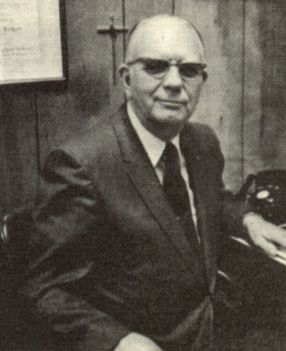BAKER, HAROLD S. PhD.
by Harold S. Baker Ph.D.
Entry T39 from the History of Hooker County Nebraska
with permission of the Hooker County Historical Society

Rev. Harold S. Baker Ph.D. - 1942
1941 Pastor
At the Annual Conference in September
1941, we were appointed to our second parish,
Mullen, Nebraska, the county seat of Hooker
County. We arrived in Mullen late and the
town was dark. There were two street lights
on main street. We were apprehensive, as
litterly, there was no room in the Hotel as it
was filled with cattle buyers. Our first contact
was Dr. David Walker, pioneer Sandhill
physician. He had just returned from a house
call, located somewhere out in the hills. He
welcomed us in his warm way, then from his
office called Mr. and Mrs. Charles Boyer, who
welcomed us to stay overnight in their home.
The next morning as I looked out the
window on that September day, I could see
the dull light of an impending storm over the
rolling hills covered with dry grass yellowed
by an early freeze, this, as far as the eye could
see.
We spent WWII years in Mullen. We wept
with those who lost loved ones and rejoiced
and welcomed those who returned. One must
live in the Sandhills to know the true warmth
and love of those hardy people.
A baby, granddaughter of Dr. and Mrs.
Walker, was brought 58 miles for baptism, my
first Sunday in the Mullen Methodist
Church.
During my pastorate at Mullen, I was
appointed County Assistance Director and
Child Welfare Worker for Hooker and Grant
Counties, an area of several hundred square
miles. I had the opportunity to live with
nature, driving those sandhill roads (trails),
in an experience one never forgets. Trails
winding along through the valleys between
the high grassy hills. One could see herds of
white faced cattle grazing and little calves
dotting the hills where left by their mothers.
Once in awhile a coyote would slip through
the tall grass. One could hear the trumpeting
of the prairie chickens and the grouse, and
watch the mating dance of the cocks. Here
and there a rattlesnake would come under the
sights of my rifle, which I carried with me for
just that purpose. There were times when a
pheasant would grace our supper table.
Dr. Walker was on the go both day and
night. We had no hospital in the area and it
was a trek of a hundred miles to Alliance to
the west or one hundred miles east to Broken
Bow and some eighty miles to the south to
North Platte. We had a 1939 two door Ford
that I had changed so the seat could be
removed and a bed made for patients to be
transported to a hospital. Gasoline and tire
rationing was no problem as we were given
priority along with the Dr.
One evening at a basketball game, a young
man asked if we could take his mother to
Alliance Hospital. She had cancer of the
throat and was bleeding profusely. It was a
foggy night and the road was winding with
two lanes. We started out with a prayer and
guts. The daughters in the back seat with the
patient, tearing sheets to absorb the blood.
We traveled the one hundred miles in exactly
one hundred minutes, with the patient in her
room. Our drive home was a little less trying.
The sun came up over the eastern hills with
a beauty I have never known before or since.
Names and faces are very clear from over
forty years ago. Lifetime friends were made
and many are gone, but their families still
remain. The Roy McCully's, Bill and Sara
Bramer in the bank, the Johnson family
owners and operators of the large Mercantile
store. The Simonsons, the Ericksens, the
Hardings, Wayne and Helen Fitzgerald, Dr.
Earl (dentist) and Helen Walker, Glen and
Claudia Tompkins, the Buechler family, Mac
Osborne's, the Barnebeys and many others,
whose faces and voices are very real to us
right now.
We were able to instigate two important
programs while in Mullen. Our first was a
Sunday School by mail program. Wayne
Fitzgerald and I worked out the program.
Children were sent lessons to be completed
and returned every week. This program
received publicity and notoriety through
Religion in the News program on radio from
Washington D.C. The other program is still
in use, The God's Herd Calf Sale. This was
initiated here and the yearly event helped
build a new and beautiful sanctuary.
Several of the friends we made, about our
age, (Mary and I), and who had families like
ours, met about once a week for fun and
fellowship. We tried to have a picnic and
cookout once a month, and during the winter
we would go to the Loup River and shovel
away the snow for our fire. Pheasant hunting
was also a pleasure, and Mary enjoyed it right
along with the best shots in the area.
Rattlesnake hunting was an adventure, too.
Wayne Fitzgerald and a few other fellows and
I would go out to a prairie dog town in the late
fall and find the rattlers out on top of the dog
mounds and we would shoot their heads off
with our twenty-two rifles. The rattles were
our trophies and at the end of the day the
hunter with the most rattles took the pot,
perhaps a dollar. Wayne took most of the
pots.
September 1946, brought tears and hear-
tache, when we were assigned to a new parish,
Bassett and Newport. However, we all left
part of ourselves in this little Sandhill
community, and it will always be home to the
Baker family.
(The above has been taken from the story
of my life prepared for my fifty year celebra-
tion in the ministry)
